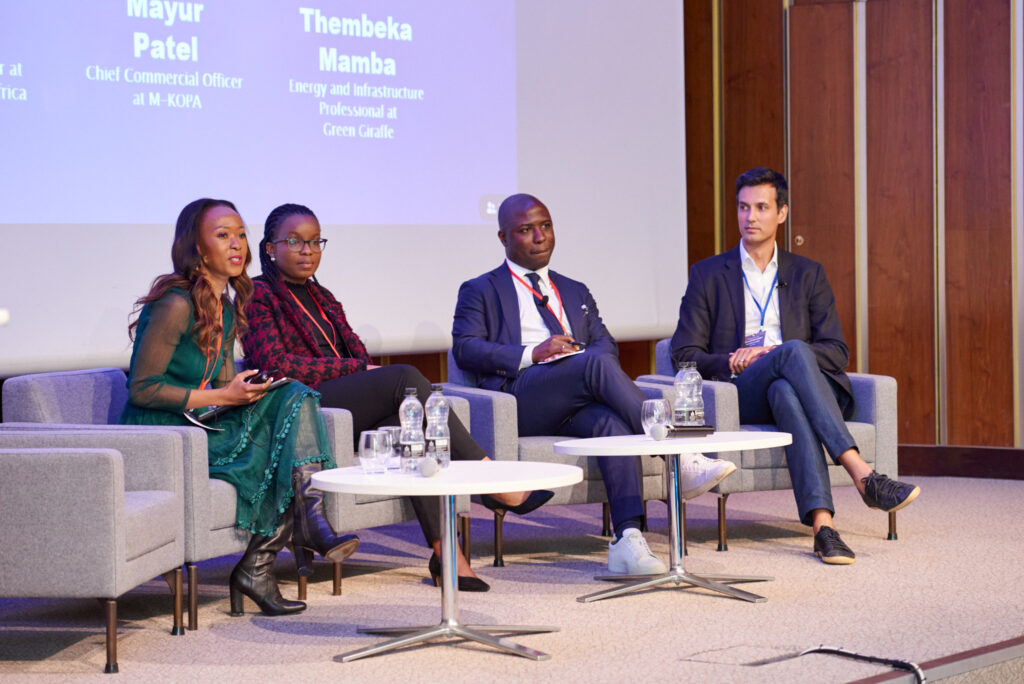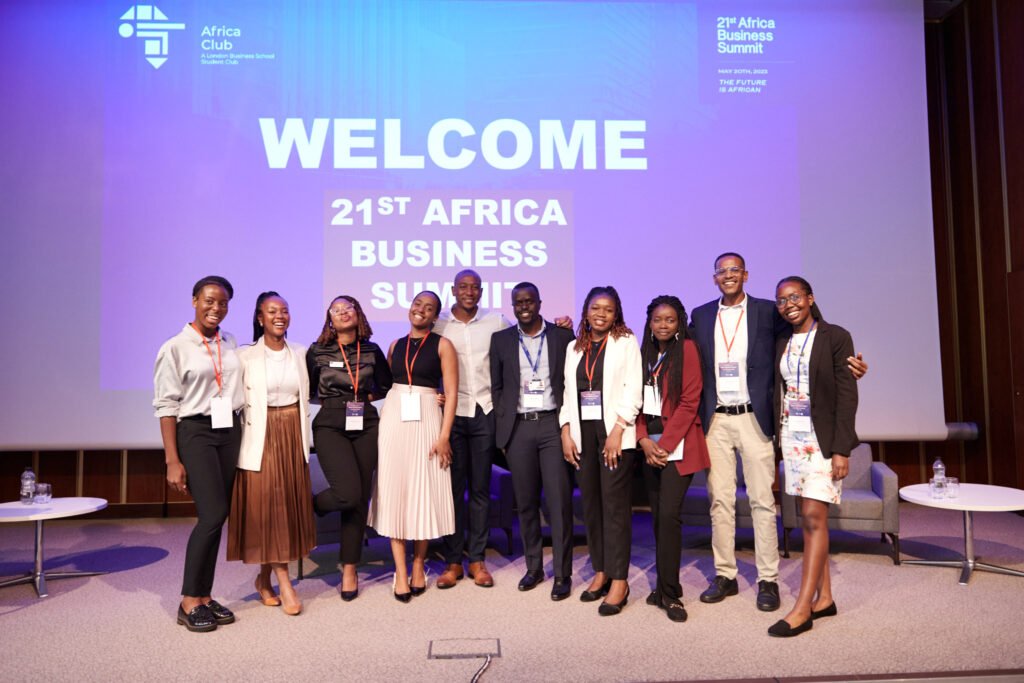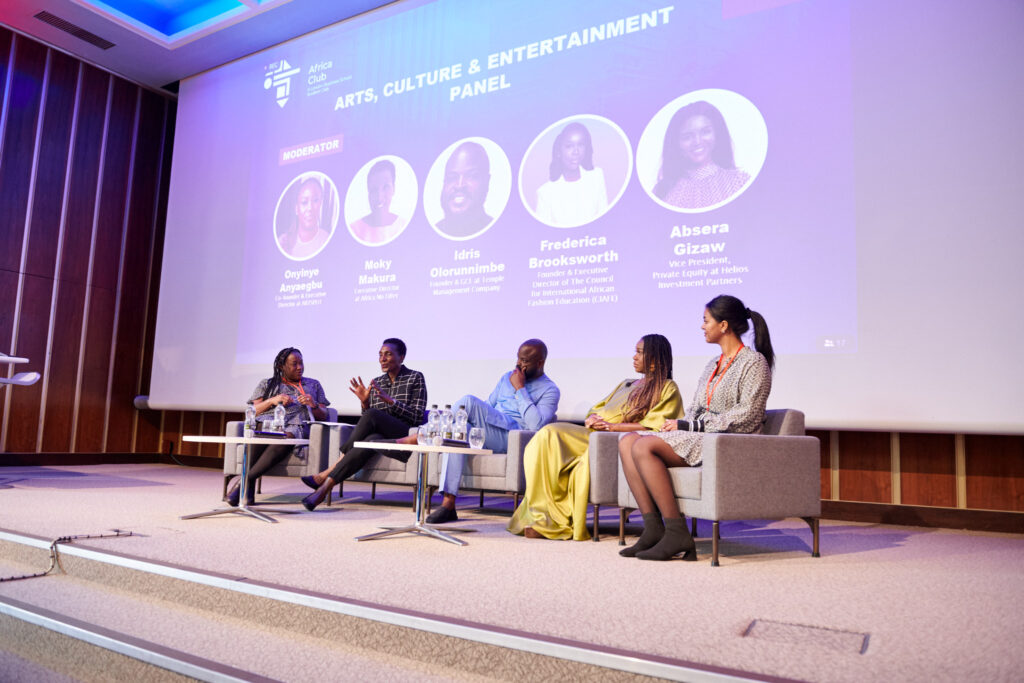The Wheeler Institute is inspired by the purpose and passion of our students, who are focused on applying innovative thinking in the area of business for development. We seek collaborations with student clubs that aim to reshape the way we think about business. The initiatives that we support allow students to apply their business skills and knowledge in complex real-world environments, whilst creating a positive and sustainable impact for local organisations and communities.
On the Saturday 20th May, The Wheeler Institute were proud to support and sponsor the 21st Africa Business Summit at London Business School. This year’s theme “The Future is African” explored the latest trends and opportunities in Africa’s business landscape. The event comprised of compelling keynotes and panel discussions with businesses, leaders and changemakers who are at the forefront of driving impactful developmental change in Africa. Speakers included LBS alumna Malebogo Mpugwa; Executive Head of Human Resources at De Beers Group, Mayur Patel, Chief Commercial Officer at M-KOPA, Yvonne Ike, Managing Director & Head of Sub-Saharan Africa (Ex-RSA) at Bank of America, and more.
Wheeler Institute Interns Tong Wu and Devanshi Shah, both studying London Business School’s MBA programme share their reflections on the Africa Business Summit 2023: The Future is African.
Revolutionising Financing in Africa
Africa’s small and medium-sized enterprises (SMEs) play a vital role in driving economic development and job creation across the continent. However, they often encounter significant obstacles in accessing financial services, as well as securing adequate funding from traditional financial institutions.

Yvonne Ike, Managing Director and Head of Sub-Saharan Africa at Bank of America was joined by Samuel Sule, Chief Executive Officer at Renaissance Capital Africa; Mayur Patel, Chief Commercial Officer at M-Kopa; and Thembeka Mamba, an Energy and Infrastructure Professional at Green Giraffe on the panel, Revolutionising Financing in Africa.
The discussion, moderated by Sthembile Nkabinde, Founder in Residence at Zinc Ventures and Advisor at All Together, focused on the challenges encountered by SMEs and an exploration of solutions. Yvonne’s address called for a transformative approach, which emhasises the need for aggressive innovation in green energy solutions, as well as balancing debt and development, and in-funding for SMEs.
She highlighted the importance of data-driven solutions that enable SMEs to achieve sustainable growth by shifting the focus from solely lending money. Additionally, Yvonne highlighted the significance of equity solutions to mobilise funding for infrastructure development before drawing attention to the current issues faced by African countries, which included the restriction on fund transfers between neighbouring countries like Nigeria and Ghana. She then highlighted the critical role that the fintech sector has in addressing these challenges.
During the talk, Mayur explained M-Kopa’s objective of empowering people in Africa by providing productive assets such as smartphones, solar panels, and refrigerators to individuals who do not have access to financing. M-Kopa is a consumer fintech, however some users utilise its services to run businesses such as salons since they face hurdles with traditional financial institutions. M-Kopa’s innovative approach unlocks finance for SMEs who lack credit access, credit records, or collateral, effectively offering a solution to challenges that traditional banks struggle to solve.
Mayur also discussed the challenges that M-Kopa faces, notably those related to debt. He mentioned that M-Kopa recently announced a significant financing round of almost $50 billion, positioning it as one of the largest debt-equity rounds within the African tech landscape. This demonstrates that the company’s difficulties extend beyond equity and encompass the complex realm of debt financing.
Samuel Sule shared the distinct roles played by Private Equity (PE) and Venture Capital (VC) in the investment landscape of Africa. VC investments are typically smaller in scale, focused on ground-level opportunities and involve smaller checks. In contrast, PE firms seek larger investments and prioritise significant returns. They diligently work to ensure that substantial amounts, such as $50 million or even billions, are invested in opportunities that yield adequate returns. PE investments in Africa are often dominated by international capital, with large economies aiming to address key challenges. VC investments, in contrast, are more diverse, with approximately $6.5 billion raised last year, of which $1.3 billion was venture capital. VC focuses on managing on-the-ground risks, identifying smaller opportunities, and mitigating associated risks.
When examining the Fintech business model, it becomes evident that it provides credit to individuals whom traditional banks may not serve. The model primarily involves taking deposits from various sources and investing in government assets to generate returns without significant effort. These dynamics are part of the investment landscape.

Samuel also discussed specific solutions that have been implemented over the last few years. One approach involves collateralising assets to secure financing, facilitated by commercial banks and development finance institutions (DFIs). Additionally, efforts have been made to support entities in accessing local currency markets, involving legal partners, advisors, and comprehensive business understanding.
To ensure effective engagement, Samuel stressed the importance of involving African capital and Africa-friendly capital sources. He cited examples of large banks like the United Bank of Africa and Ecobank, where access to global markets and structured dollar financing contribute to establishing robust African contingents, enabling investments at various levels.
Thembeka highlighted the need for increased private-sector participation in financing power and energy projects across the continent, considering the significant number of individuals who lack assets and the limited role of sustainable finance institutions. Collaborative efforts between the private and public sectors are crucial to bridge the financing gap.
Further, Thembeka recognised the importance of managing risk in attracting private-sector funding. She mentioned the establishment of structures and institutions to mitigate risks and mobilise private capital, particularly in areas that are typically not invested in. Additionally, she highlighted the significance of innovative approaches, such as sustainability-linked debt structures, which align financial incentives with carbon reduction targets.
Thembeka also acknowledged the role of government in redefining energy agendas and priorities through well-defined visions and goals. Transparent and coherent government policies instill confidence in investors and provide direction for the sector. She cited examples of initiatives like power integration and vendor finance structures that facilitate private sector engagement and investment.
Arts, Culture and Entertainment
In 1950, one in every ten people in the world was African; by 2050, this number will be one in every four. This staggering increase in the composition of Africans in the global population is a call for a deeper dive into understanding a frequently misunderstood geographic region.
Onyinye Anyaegbu, Co-founder of ARTSPLIT, moderated the session on Arts, Culture and Entertainment, and panellists included Idris Olorunnimbe, Founder of Temple Management Company, Moky Makura, Executive Director of Africa No Filter, Frederica Brooksworth, Founder of The Council for International African Fashion Education, and Absera Gizaw, Vice President, Private Equity at Helios Investment Partners.

Onyinye began the discussion by asking Moky to explain the motivation behind Africa No Filter. Moky went on to describe how this non-profit organisation is committed to changing the narrative of African storytellers and stories, as well as the importance of these narratives being sustainable. Africa No Filter has established a ‘Creative Vibrancy Index’ that evaluates the infrastructure assistance available to creatives in various African cities using 22 variables. According to these rankings, Johannesburg has the most culturally vibrant economy, closely followed by Lagos. Investors, entrepreneurs, creatives, and other industry players can better understand the sector’s economics and make informed financial and investment decisions as a result of the data and analytics provided by this index.
Onyinye and Frederica spoke about the way African fashion can establish itself on a global scale. Frederica remarked that African fashion is “no regular beast,” especially because it is an unregulated industry. A noteworthy point was the reminder that Africa is vast and that each region is substantially different from the others. Botswana, for example, is well-known for its leather, whilst Ethiopia is renowned for its fast-fashion scene.
Contrary to popular belief, Frederica attributes the biggest barrier to the global positioning of African fashion to media regulations rather than education or the fashion itself. To go beyond this, she advocates for opportunities for collaboration. British Vogue, for example, includes writers and ads representing African fashion entities. Involving the African diaspora on platforms like these helps to bridge the gap and share African experiences in a way that a wider audience can understand and relate to. Another example given by Frederica was social media, which as a platform facilitates the sharing of stories without bias.
Given the magnitude of these challenges, Onyinye invited Idris to give his thoughts on the government’s responsibility in establishing a sufficient infrastructure for creatives. Idris began by giving an insight that caught the audience’s attention: the popularity of MARVEL’s Black Panther.
As the first black superhero movie in mainstream American cinema, this franchise enabled the development of an infrastructure to further enhance African culture and entertainment. Idris identified three areas of weakness: infrastructure, skill, and talent. To address the skills gap, Idris’ Temple Management Company formed a creative partnership with the government and has trained over 1,000 young creatives. Idris stressed the importance of changing mindsets. He asked the audience how many Africans were present, how many were studying or had studied abroad, and how many would return to their homes in Africa.
Finally, Onyinye turned to Absera to better understand access to financial resources for Nollywood, the Nigerian film industry, and perhaps a portmanteau extending to the wider African film industry. Absera explained that there are not enough resources for everyone and that there is a significant need for grant money for African creatives. She also stated that Netflix, in particular, has been particularly interested in Africa and is the key to unlocking and harnessing the potential of African entertainment.
Moky emphasised that, in her view, the key to unlocking the potential of African entertainment is to start thinking about the monetisation side of content development, rather than just the art itself. Films made in West Africa, for example, fall into the ‘artsy’ genre and are not made for commercial purposes. It is critical to tap into the business mentality, as well as recognise that the most crucial aspect of filmmaking is not just making the film, but also promoting it through the appropriate channels.
The panellists and moderator all agreed that there is a need for continual training and education for skill development in order to cultivate a creative and equipped workforce to truly make Africa the future.
About the Africa Business Summit
The Africa Business Summit has established itself as a leading forum in Europe for shaping an integrated and innovative perspective on Africa’s future. It is a student-led initiative that attracts an audience of over 500 investors, policymakers, business leaders, professionals, diaspora, students, and alumni. Distinguished past speakers include His Excellency Nana Akufo-Addo of Ghana, Dr. Mo Ibrahim, Founder & Chair of Mo Ibrahim Foundation, Jingdong Hua, VP and Treasurer of IFC, the late Bob Collymore, former CEO of Safaricom Limited, Jay Ireland, President and CEO of GE Africa and Bob Diamond, Founder of Atlas Mara.
About the Authors
Devanshi Shah (MBA 2024) worked for five years in economic and financial consulting in India and the UAE before coming to LBS. She has advised clients across industries including construction, oil and gas, retail, and real estate, on how to value monetary and other damages arising from legal disputes. She is passionate about inclusivity in finance and education, particularly that marginalized populations in developing countries should be a focus in policy decisions.
Tong Wu (MBA 2024) has nine years of experience in healthcare, thinktank and tech start-ups across different regions – China, East Africa, North Africa and the Middle East. She is an experienced researcher, marketer, and entrepreneur. She is passionate about innovative business models to empower SMEs in developing countries and sustainable economic development.
